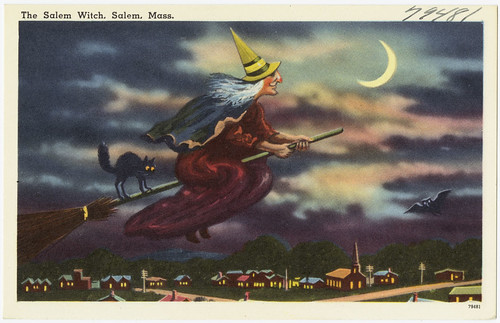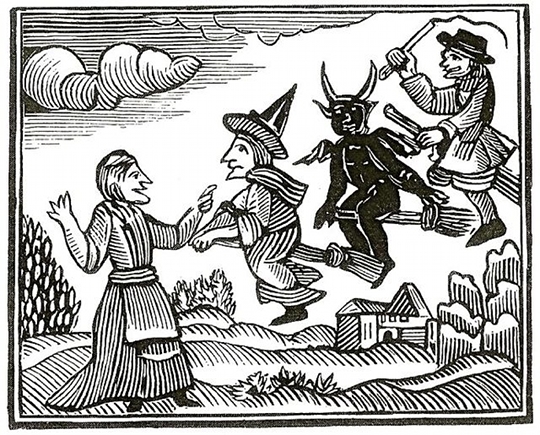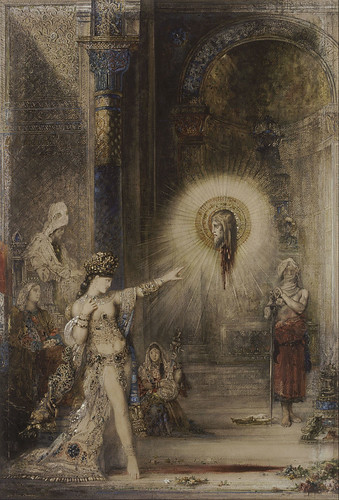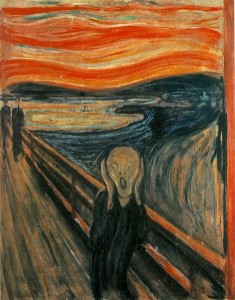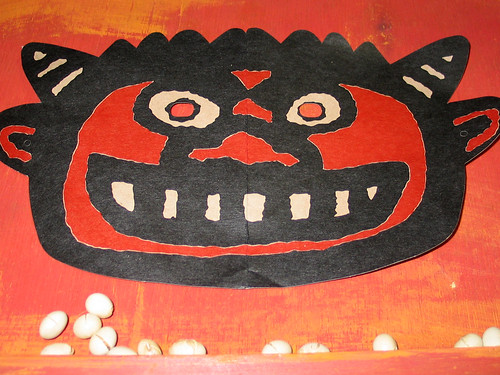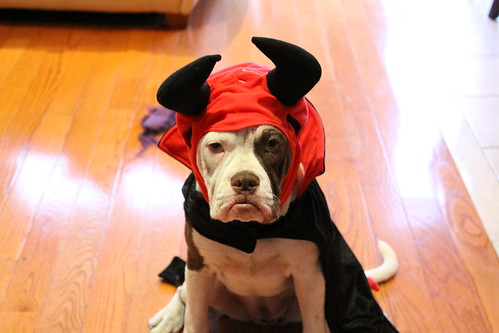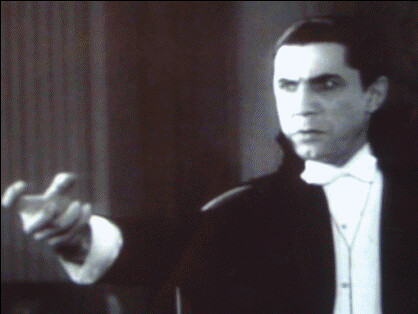A coven, if you didn’t already know, is an assembly of witches, often 13. The word is a variant of covent, which is another word for convent, a community especially of nuns, which some might say is the opposite of a coven of witches.
The Online Etymology Dictionary says that the association between coven and witches arose in Scotland and was popularized by Sir Walter Scott:
The witches of Auldearne, according to this penitent, were so numerous, that they were told off into squads, or covines, as they were termed to each which were appointed two officers.
What about witch? It’s an old word – circa 800 AD – that ultimately comes from the Old English wiccian, “to practice witchcraft,” and originally referred to “a man who practises witchcraft or magic,” says the Oxford English Dictionary (OED).
About 200 years later, the word meant “a female magician, sorceress,” and still later “a woman supposed to have dealings with the devil or evil spirits and to be able by their co-operation to perform supernatural acts.”
The Online Etymology Dictionary says the term witch-hunt originated in the 1630s — European witch trials peaked between 1580 and 1630 while the American Salem witch trials were a bit later, from 1692 to 1693. However, the OED’s earliest citation is from 1885 in H. Rider Haggard’s King Solomon’s Mines: “It is the great witch-hunt, and many will be smelt out as wizards and slain.” If anyone has any additional information on witch-hunt, please let us know.
Witch-hunt gained its figurative meaning, “an investigation carried out ostensibly to uncover subversive activities but actually used to harass and undermine those with differing views,” in the early 1930s, says the Online Etymology Dictionary. However, we found this citation from 1927 in The Boston Globe (partial due to paywall): “. . .by showing that the prisoner refused to ‘commit murder’ in the name of his Government is reminding the world of the days of witch-hunting at its worst.”
The witch of witch hazel has nothing to do with magic or spells, and is even older than the sorcerer meaning of witch. It comes from the Old English wice, “wych-elm,” which comes from wican, “to bend.” Wican also gives us weak.
To witch meaning “to use a divining rod to find underground water or minerals” is fairly new, originating in the 1960s, says the OED. It comes from “the fact that it was usually done with a witch-hazel wand.”
The earliest sense of the word hag, “a repulsive, vicious, or malicious old woman,” is from the 14th century, says the OED. By the 1550s, it came to mean “an evil spirit, dæmon, or infernal being, in female form,” and by the 1580s, “a woman supposed to have dealings with Satan and the infernal world; a witch.”
One of our favorite words is hag-ridden, “ridden by hags or witches, as a horse,” and thus “afflicted with nightmare,” and is from the late 1600s.
The word hag is probably a shortening of the Old English hægtesse, “witch, fury,” says the Online Etymology Dictionary. The first part of hægtesse may be related to the Old English haga, “enclosure, portion of woodland marked off for cutting.” The Old Norse tunriða and Old High German zunritha, both literally “hedge-rider,” referred to witches and ghosts. The second part of hægtesse may be connected to the Norwegian tysja, “fairy; crippled woman.”
Hex, now more commonly referring to “an evil spell; a curse,” is also another word for witch. The witch meaning is earlier, coming from around the 1850s or earlier, while the curse meaning is from around 1909. Hex, surprisingly (or at least to us) originated in the United States, coming from the Pennsylvania German hexe, “to practice witchcraft,” which comes from the German Hexe, “witch.”
Most of us know that to badmouth someone means to criticize or malign, but the word’s origins lie in hexes and curse. While the word gained its verbal abuse meaning in the early 1940s, it originated in the 1830s, or probably much earlier, in African American English as a translation of “an idiom found in African and West Indian languages” meaning “a curse, spell.”
Ever wonder why witches are often portrayed as riding on broomsticks? The idea may have been popularized by “engravings from a famous Lancashire witch trial of 1612,” according to the Online Etymology Dictionary. The “sweeping with broom twigs were considered unlucky in May,” hence a possible connection with witches.
Speaking of flying, the term fly-by-night has witchy origins as well. The term we know to mean “an unscrupulous or undependable person, especially one who leaves secretly without paying creditors,” as well as “of an impermanent or insubstantial nature,” originated around 1796 as an “old term of reproach to a woman signifying that she was a witch.”
What are some of your favorite witchy words?
[Photo: “The Salem Witch, Salem, Mass.,” CC BY 2.0 by The Boston Public Library]
[Photo: “witch hazel,” CC BY 2.0 by Jesse Hirsch]
[Photo: Woodcut of witches flying via Public Domain Review]
